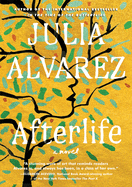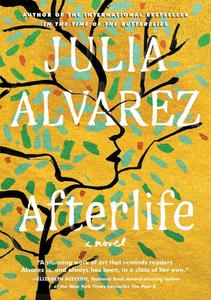
 Julia Alvarez (In the Time of Butterflies; A Wedding in Haiti) wrings incredible emotion from her thoughtful novel Afterlife.
Julia Alvarez (In the Time of Butterflies; A Wedding in Haiti) wrings incredible emotion from her thoughtful novel Afterlife.
Set in present-day Vermont and around the East Coast and Midwest, the story follows retired college professor Antonia Vega through a time of grief and turmoil. Her husband, Sam, has just died, and while Antonia is adjusting to the "afterlife," her older sister, Izzy, disappears. Antonia and her other sisters believe Izzy has bipolar disorder, and hire a private investigator to help them find their missing sibling. While this is going on, Antonia's neighbor, Mario, an undocumented farm worker, solicits her help in getting his undocumented girlfriend, Estela, away from the coyotes who facilitated her illegal crossing and safely to Vermont. Alvarez pulls all these threads together into a narrative that is in equal measure pensive and taut.
Much of Afterlife focuses on the fears and torments immigrants face daily. Antonia returns home after trying to locate her sister to find Estela hiding out in her garage. The frightened young woman is pregnant, and Antonia does her best to help her. Antonia herself is a Latina immigrant--one long settled in the U.S., but who still struggles to feel confident in the Anglo world. Alvarez contrasts her protagonist's otherness with the desperation of Estela in what amounts to a compelling examination of first-world privilege. The novel also captures the omnipresent threat of deportation of undocumented workers, the ongoing menace of ICE raids and the way the undocumented are both exploited and discarded by U.S. society. Some of the tensest moments in the book come when local law enforcement officials confront Antonia about Estela.
More than anything, though, Afterlife is a poignant meditation on death and the many ways humans deal with the absence of loved ones. Sam lives on through Antonia in how she thinks and speaks, reminding her to do good in the world. Antonia is aging, and she wonders what legacy she'll leave behind, how she will persist, if at all, in the imaginations of others. Alvarez's deft prose turns beautifully evocative at just the right moments, producing a heightened sense of mortality and human yearning: "The evenings are long, the light lingering like a child fighting sleep to have one more bit of the day gone by."
Afterlife is a succinct and powerful novel about human connection. Alvarez writes with depth and the hard-won wisdom that comes with age and experience. She is a writer in full command of her form, reminding the world of her vast and venerable talent. --Scott Neuffer, writer, poet, editor of trampset
Shelf Talker: In Julia Alvarez's moving novel, a widow must find her distressed sister and help an undocumented couple while contending with her own mortality.

